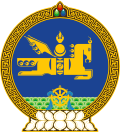| Country | Relations | Legal basis |
|---|
 United States United States | Strategic third neighbor partnership | In July 2019, a joint declaration of a strategic partnership was signed during President Khaltmaagiin Battulga's state visit to the United States of America. [5] [6] |
 Japan Japan | Special Strategic Partnership for Peace and Prosperity | Joint statement made during President Ukhnaagiin Khürelsükh's state visit to Japan in November 2022. [7] The talks elevated the bilateral ties from a strategic partnership established in 2010 to a 10-year-long "Special Strategic Partnership for Peace and Prosperity". [8] |
 Germany Germany | Strategic partnership | Joint declaration made during President Frank-Walter Steinmeier's visit to Mongolia in February 2024. [9] |
 South Korea South Korea | Strategic partnership | In September 2025, a declaration was signed during a high-level online summit between President Ukhnaagiin Khürelsükh and President Moon Jae-in. Bilateral relations between the two countries advanced from a comprehensive partnership, declared in 2011, to a strategic partnership. [10] |
 Kazakhstan Kazakhstan | Strategic partnership | Joint declaration made during President Kassym-Jomart Tokayev's visit to Mongolia in October 2024. [11] |
 Turkey Turkey | Strategic partnership | Joint declaration was signed by both presidents during President Ukhnaagiin Khürelsükh's state visit to Turkey in January 2025. [12] [13] |
 India India | Strategic partnership | A joint statement was made during Prime Minister Narendra Modi's state visit to Mongolia in May 2015. [14] [13] |
 Italy Italy | Strategic partnership | [13] |
 France France | Strategic partnership* | After a state visit by President Emmanuel Macron in May 2023, [15] a cooperation agreement was signed by Mongolian Foreign Minister Batmunkhiin Battsetseg and French Foreign Minister Catherine Colonna in October 2023. [16] |
 Vietnam Vietnam | Comprehensive partnership | Joint statement made during President Tô Lâm's state visit to Mongolia in October 2024. [17] |
 Czech Republic Czech Republic | Comprehensive partnership | [13] |
 Uzbekistan Uzbekistan | Comprehensive partnership | A joint declaration was signed during President Shavkat Mirziyoyev's visit to Mongolia in June 2025. [18] |
 Kyrgyz Republic Kyrgyz Republic | Comprehensive partnership | Joint declaration was made during President Ukhnaagiin Khürelsükh's state visit to the Kyrgyz Republic in July 2025. [19] [13] |
 Poland Poland | Comprehensive partnership* | [13] |
 Canada Canada | Expanded partnership | Joint statement made during President Natsagiin Bagabandi's 7-day visit to Canada in October 2004. [20] |
 Australia Australia | Expanded partnership | According to a statement made by the Australian Foreign Minister Alexander Downer during his 2007 state visit. [21] |
| Source: Office of the President of Mongolia |



